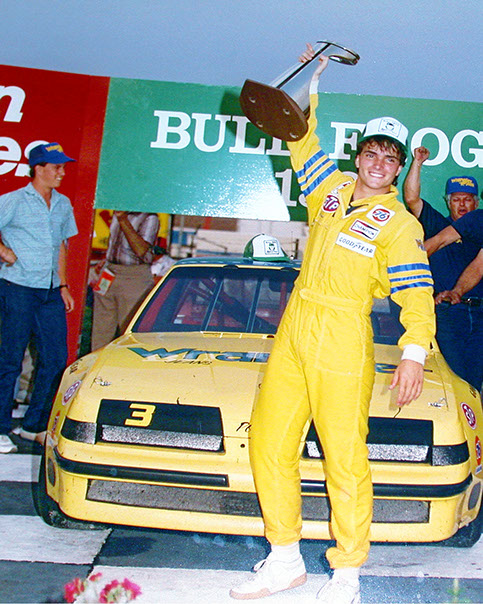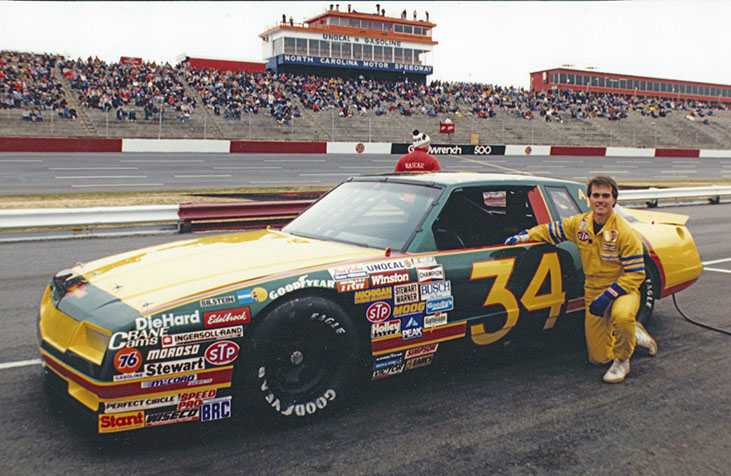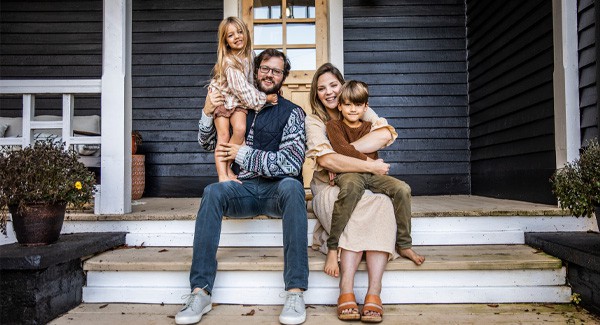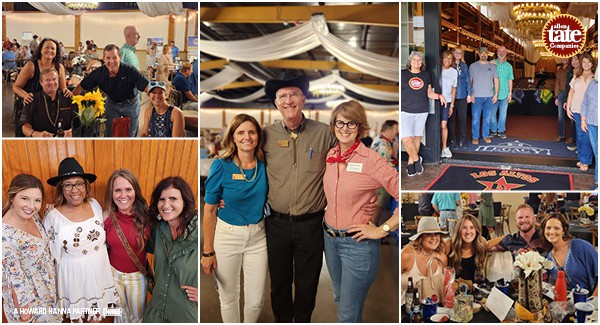
Last Updated on September 29, 2022
Jesse Samples Jr. never planned to become a race car driver. But the road of life brought some exciting twists and turns that sent Samples, now an Allen Tate Realtor®, on a high-speed journey most could only imagine.
At 4, Samples was given a go-cart by his uncle, who helped manufacture carts sold through the Sears catalog. Samples was too short to reach the pedals without extensions and learned to ride in his grandparents’ yard.
A few years later, Samples’ parents divorced and he lived with his father in Charlotte. They spent the weekends riding go-carts but entered some local races for fun.
That year, they won the local track championship; the next, they won state championships in North and South Carolina; and the year after that, they took on the World Karting Association. By the time Samples was 11, he had won the national championship.
What started as a hobby had quickly turned into “Hey, we’re pretty good at this.” By age 15, Samples had won every title imaginable in 120-mile per hour karts racing on big tracks like Daytona International Speedway and some of the best road course tracks around the world including Laguna Seca. After winning multiple World Cup championships and the title of Prince of Karting USA, his accomplishments drew the attention of Humpy Wheeler, former president and general manager of Charlotte Motor Speedway.
It was Wheeler who suggested Samples might try something else: racing in the NASCAR late model stock car races on Saturday night at Hickory Speedway. Samples and his father bought and fixed up a 10-year-old Camaro, and Wheeler helped Samples get his NASCAR license at age 15.
“At the time, I was the youngest person ever to be given a NASCAR driver’s license. It had a big red stamp on it that said minor,” said Samples.
The first time Samples showed up to register for a late-model race, track champion Max Prestwood thought he was in the wrong line and sent him over to the spectator’s ticket booth. Samples had to learn how to drive a stick shift the day before his first race, just to get the car out of the pits.
“My goal was to be consistent, stay out of trouble and the walls, and gain experience,” said Samples.
After two years, Wheeler encouraged Samples to get into the Charlotte/Daytona Dash Division, and pick up a ride for upcoming Daytona 500 race week.
Easier said than done, but Samples’ father worked out a deal to rent a car that the owner was hoping to sell to a buyer at Daytona. After virtually no practice time, Samples qualified sixth and finished his first NASCAR race at Daytona in fourth place.
During Daytona Speed Week, Samples was invited to a party for Dale Earnhardt Sr., sponsored by Wrangler Jeans. The company had taken notice of a smaller jeans company logo on Samples’ car, and he was on their radar.
Shortly before the NASCAR race in Charlotte, Wrangler called Samples and asked to sponsor him. The deal was that Samples would put together a different car, without the other company’s logo, and Wrangler would try him out for one race.
His dad, Daytona crew chief Charlie Sigmon and Samples’ high school girlfriend’s father pulled together enough money to buy a car, which they painted to look identical to Earnhardt’s No. 3 car.
Samples qualified seventh but ran into trouble during the race with a bad wheel nut that put him in 50th position, with less than 60 laps to go. He ended up passing everyone and winning the race – the youngest driver to have even won on a super speedway. Driver Buddy Baker complimented the way he handled the traffic; Darrell Waltrip commented that watching Samples felt like looking in a mirror.
Wrangler offered Samples a handshake agreement, with a contract to start in October. He was the fresh-faced kid to promote Wrangler jeans to a younger generation, learning from Earnhardt whose personal brand targeted the “good ole’ boys.”
Samples had just turned 18 and was still in high school.
Soon after, Samples was invited to Hollywood by one of the country’s premier publicist firms, Guttman & Pam. He was hoping to secure sponsorships, but he instead was offered a modeling contract. With one catch – Samples would have to give up racing. And he said no.
 A few months later and a week before Samples was to sign his contract with Wrangler, the company was bought by VF Corp. – which had no interest in being a part of NASCAR. Earnhardt found a new sponsor – Goodwrench – and a new black car. Samples was out of a deal.
A few months later and a week before Samples was to sign his contract with Wrangler, the company was bought by VF Corp. – which had no interest in being a part of NASCAR. Earnhardt found a new sponsor – Goodwrench – and a new black car. Samples was out of a deal.
After trying a few more races, Samples decided it was time to put his racing career behind, go to college and play football at Appalachian State University, where they had offered him a spot as the kicker. Or so he thought.
Take 2: A short time later, Samples followed his father to Allen’s Auto Glass in Charlotte, for a repair to his dad’s windshield. Owner Ken Allen recognized the name and struck up a conversation with his dad. Allen wanted to put together a Winston Cup team, and he asked Samples to drive for him.
Samples quickly learned the ropes and got his Winston Cup license with help from Richard Childress and Wheeler. He scrapped the opportunity to play football at Appalachian and enrolled at Winthrop University, close to home, so he could race. He wound up starting a race at Rockingham beside his childhood heroes Cale Yarborough, Richard Petty, Bobby Allison, Waltrip and Earnhardt. Unfortunately, Samples hit the wall and couldn’t finish.
During the next race, at North Wilkesboro, Samples knocked Richard Petty into the wall and “he didn’t look happy.” But his adrenaline rush was short-lived when Samples’ engine blew and his race was finished. And the race after that brought more problems. Soon, Allen would fold the team and Samples was out of a contract – again.
Take 3: At the same time, Samples was approached to start an Indy car team to be sponsored by Imperial Chemical Industries, a British company. He had a sponsorship package, a signing bonus, base salary, percentage of winnings and personal endorsements. In 12 days, the deal would be finalized by the company’s attorneys in Europe. Eight days later, the second biggest stock market crash since the 1920s happened – Black Monday 1987 – and ICI cancelled plans for a team.
Take 4: Samples worked a one-time sponsorship deal with Golding Farms Honey to race in Daytona in 1988. Despite a poor qualifying time, Samples fought his way to the lead and was drafting for the final few laps, when his engine blew.
It was time for his racing career to end.
Samples was 19, and despite a decorated run, he had missed being a kid. He remembered a letter Wheeler had given him at age 15 about the importance of education, so he finished his degree at Winthrop.
After college, Samples worked in the family furniture business with his dad. Later, he earned his real estate license and worked with Pulte Group selling new homes communities. In 2010, he joined his wife, Sarah, at the Allen Tate Providence @485 office, and together they have achieved many top honors.
“It’s been a great ride,” said Samples.
When he left racing, Samples vowed to never go to another race track. For years, he kept that promise. But he’s come around and became a fan of Formula One, MotoGP and NASCAR. Later this month, he’ll make a guys’ trip to the Indianapolis 500 with a childhood racing buddy.
“In racing, the driver is part of a team. All parts of that team must work perfectly together to put the car in a position to win. But at the end of the day, it’s the driver who must be willing to put his life on the line to get the job done,” said Samples.



